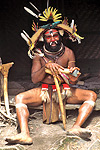The power of witchcraft in Africa
African notions of witchcraft are neither archaic nor static but are highly flexible and deeply attuned to the conundrums of our contemporary world.

Withdoctor dressed for the part
